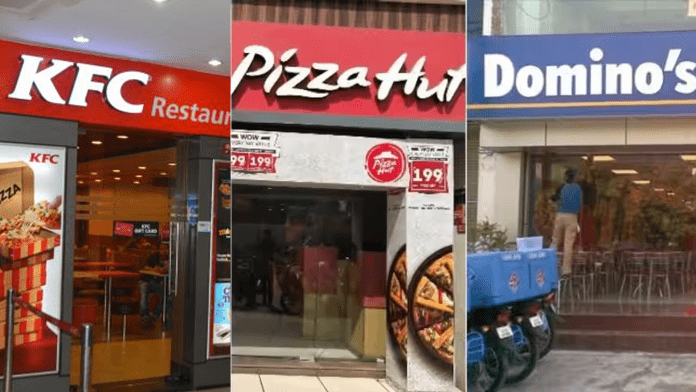Pizza chains Domino’s and Pizza Hut, along with the fried chicken chain KFC, have been identified as the top three Quick Service Restaurant (QSR) chains in India based on store count, as revealed by a survey conducted by GapMaps, a cloud-based data intelligence platform. These well-known establishments have successfully expanded their presence throughout the country, solidifying their positions as leaders in the QSR industry.
According to the latest Fast Food & Quick Service Restaurant (QSR) Retail Network Report in India for 2023, Domino’s has secured the top spot with its impressive store network. With over 1,500 locations spread across India, Domino’s outshines its competitors. What sets Domino’s apart is its widespread presence in the country, as it manages to have at least one store in nearly all of the 86 cities with a population exceeding one million residents. Additionally, Domino’s has made its mark in 211 cities with a population of over 500,000 residents, further solidifying its dominance in the Indian market.
In the QSR segment, Pizza Hut closely follows Domino’s with a strong presence at 787 locations throughout India. This impressive number of outlets positions Pizza Hut as the second-largest store network in the country, showcasing its competitive standing in the market.
Following closely behind Pizza Hut, the fried chicken chain KFC secures its position on the list with an impressive presence at 769 locations across India. This substantial number of outlets establishes KFC as a prominent player in the QSR segment, further contributing to the brand’s popularity and reach in the Indian market.
The comprehensive report monitors and analyzes the store counts and market penetration of 13 prominent QSR and fast food brands across a vast network of 6,000 locations throughout India. This extensive coverage provides valuable insights into the market presence and reach of these brands, offering a comprehensive overview of the QSR industry in the country.
Other notable brands, such as Wow! Momo and McDonald’s, also boast significant store networks, with each brand maintaining a presence at more than 500 locations.
With the exception of Domino’s, the report reveals that the brands under observation lack established store networks in tier 2 cities, which include cities with populations ranging from 500,000 to 1 million residents.
In cities with less than 5 lakh residents, the store networks of the tracked brands are relatively limited. Typically, these smaller cities only have stores present if there is an additional significant driver of sales beyond the local residents, such as a major passing highway, a tourist precinct, or a satellite/commuter city.
GapMaps, an Australian company established in 2013, specializes in providing businesses with expert guidance for optimal location decisions. Through its advanced platform, GapMaps Live, the company seamlessly incorporates up-to-date socio-demographic, economic, customer, and competitor intelligence. With a global presence, GapMaps Live operates in 23 countries and serves over 500 clients from various sectors including fast food, cafes, health and fitness, and more.





